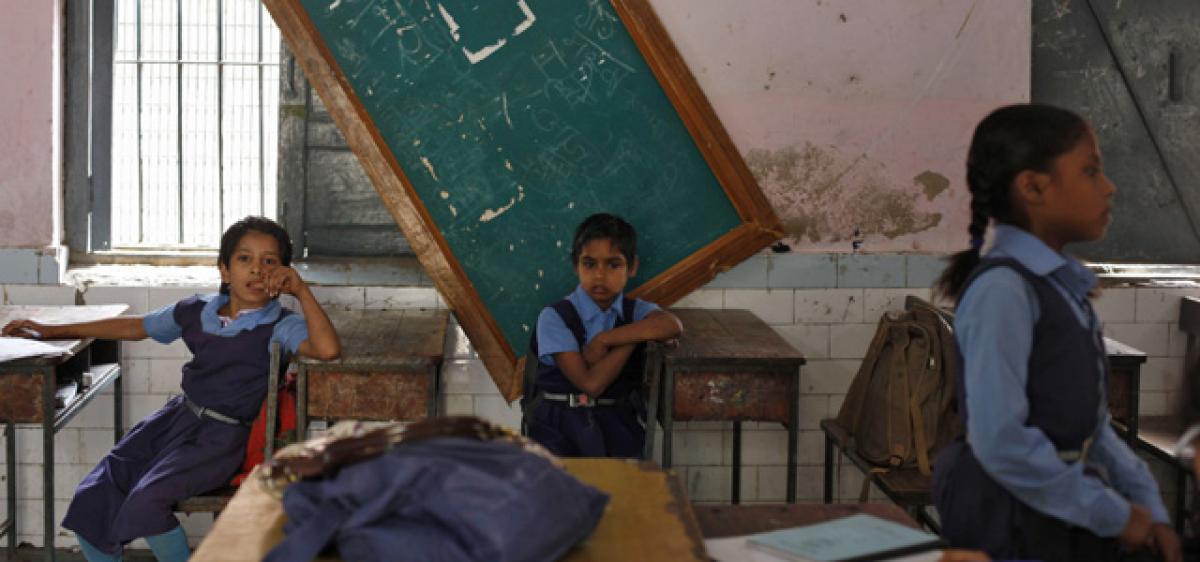Live
- Has Allu Arjun's ‘Pushpa 2’ raked in Rs. 1000 Crore Pre-Release Business?
- Reports of spat with Netanyahu misleading: Germany
- 5.0-magnitude quake hits Alaska Peninsula
- AP assembly elections: Filing of nominations in full swing in the state
- Alaya F stuns in denim look, exudes boss babe energy
- Brillare Clinic Celebrates First Anniversary with Gratitude and Glamour
- Tillu Square: Sidhu Jonnalagadda’s Film to Stream on Netflix in 5 Languages
- Sharwanand’s ‘Maname’ teaser: A glimpse into a refreshing tale
- Hyderabad: ‘SSMB 29’ pre-production underway; team spotted at airport
- LG raises $800 million bond for R&D & facility investments
Just In

A government school that needs 59 teachers being run by two temporary appointees: This is not a story from a poor, rural backwater but from the National Capital Territory (NCT) of Delhi, India’s richest (by per capita income) and ninth most literate province.
A government school that needs 59 teachers being run by two temporary appointees: This is not a story from a poor, rural backwater but from the National Capital Territory (NCT) of Delhi, India’s richest (by per capita income) and ninth most literate province.
This and the fact that nearly half the teaching positions in Delhi government schools the data did not include municipal schools are either vacant or have been filled by a "guest" or temporary teacher were revealed in an 81-page affidavit filed in the high court by the Delhi government in December 2016.
This data was not made public before the court case, which was filed by a parent who sought more teachers and better infrastructure for his child's tin-roofed school. With its failure to recruit teachers, Delhi where half of grade VI students cannot read is allowing its poorest, most vulnerable students to be taught by temporary, possibly unmotivated, teachers who earn less than half as much as their permanent counterparts, excluding job security and benefits.
Government schools in Delhi depend on teachers, who earn 42 percent of the salary of regular teachers and are denied job benefits like pension.
This reliance on ill-paid teachers could be one reason why Delhi's 86 percent literacy rate does not translate to real learning. More than 200,000 grade VI students, or half, in Delhi government schools cannot read, according to a June 2016 government study.
The problem of low-learning outcomes is not unique to Delhi. One in every six teaching positions in India's government schools which educate the poorest children and provide an education to more than half of India's 260 million school children is vacant.
To understand the reasons for Delhi's teaching crisis, one should realise that shortages are caused not so much by the State's low spending per student- at Rs 3,852 in 2014-15, it is 66 per cent lower than the national average of Rs 11,252-but a tangled, outdated and, often, illogical, hiring process.
For instance:
* The Delhi Subordinate Services Selection Board (DSSSB), which recruits teachers in Delhi, also hires patwaris, nurses and malaria and food inspectors for the government. This means delays, with further time lost during the exchange of candidate dossiers between the board and the education department.
* Seven years after it began in 2010, hiring for some permanent assistant teacher positions for Delhi's municipal schools is still incomplete, one reason being that the same teachers were hired for different positions -- by the same recruitment board.
It is known that hiring good teachers and making them take their job seriously is important for education. Shortage of teachers is directly related to learning outcomes, Kapila Parashar, a veteran Delhi government-school teacher, who is part of the mentorship scheme started by Chief Minister Arvind Kejriwal for Delhi schools, argued.
There are 59,409 teaching positions in Delhi government schools but it has permanent teachers at only 33,569 (56 per cent), the Delhi government admitted in the high court last month, in a case argued by Ashok Agarwal, a child-rights activist and lawyer.
A contract teacher is employed on yearly contract as part of the Centre's Sarva Shiksha Abhiyaan with salary shared 75:25 with State governments. Guest teachers are paid by the State Government per day.
A temporary teacher earns between Rs 15,000 and Rs 20,000 per month, but holidays can lower this amount; while a permanent teacher's salary ranges from Rs 40,000 to Rs 60,000 per month -- those who teach senior classes earn more excluding benefits.
The answer to who vacancies are not filled lies in a centralised, illogical hiring system that takes years to fill vacancies. The DSSSB is responsible for all teacher recruitment in Delhi, for both government and municipal schools. More Indians are moving their children to private schools. The situation in India's capital city indicates why. (In arrangement with IndiaSpend.org).
By APARNA KALRA

© 2024 Hyderabad Media House Limited/The Hans India. All rights reserved. Powered by hocalwire.com







